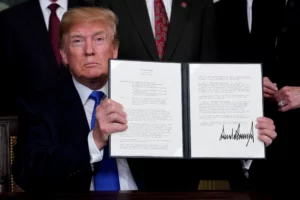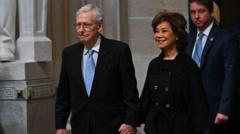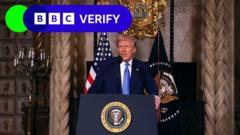President Trump lays out a comprehensive plan for implementing reciprocal tariffs against countries with unfair trade practices, emphasizing the protection of American industries and jobs, particularly targeting aluminum, steel, and imports from Canada, Mexico, and China.
Trump Unveils New Trade Strategy: Reciprocal Tariffs to Protect American Industries

Trump Unveils New Trade Strategy: Reciprocal Tariffs to Protect American Industries
In a significant update on his trade policy, President Trump introduces reciprocal tariffs aimed at balancing trade relations and safeguarding U.S. manufacturing.
President Donald Trump has introduced an ambitious approach to trade policy, proposing the implementation of reciprocal tariffs aimed at equalizing trade relations and safeguarding American businesses. In a recent post on Truth Social, Trump elaborated on the mechanics of these tariffs, which are positioned as a reaction to unfair trade practices from other nations.
Highlighting the use of value-added tax (VAT) systems in various countries, Trump indicated that such mechanisms act as more severe barriers than traditional tariffs. He characterized these practices as detrimental to American industry by creating an uneven playing field for U.S. exports.
Trump outlined specific measures, including a 25% tariff on all aluminum and steel imports, alongside similar tariffs on products coming from Canada and Mexico. Additionally, he proposed a 10% tariff on goods from China. These steps, he argued, are vital for enhancing the competitiveness of American manufacturers against foreign competitors who engage in what he sees as unfair trade tactics.
Moreover, Trump’s administration aims to prevent companies from undermining tariff regulations by routing products through third-party nations. His messaging emphasizes a strict stance against these practices, reinforcing that any attempts to avoid tariffs will face significant scrutiny.
The President framed these new policies as a pathway to fairness, asserting that by imposing equivalent tariffs on foreign countries, the U.S. can promote domestic production, stimulate job growth, and address trade deficits more effectively.
As the global economic landscape shifts with these declared policies, Trump's trade strategy marks a distinct move towards a form of economic nationalism focused on prioritizing American interests over international competition. Observers of global markets are poised to watch how these developments unfold in the coming months.






















